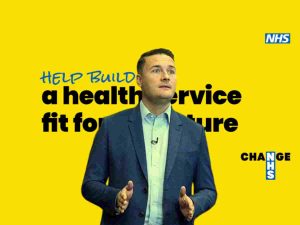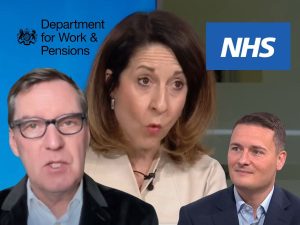Leicester’s Shockat Adam did the country a great service by defeating Jon Ashworth in the 2024 general election. And now, he has joined forces with Jeremy Corbyn. They and fellow independent MPs Ayoub Khan, Adnan Hussain, and Iqbal Mohamed have united as the Independent Alliance.
The corporate media has been predictably awful in its framing of the parliamentary grouping’s formation. So the Canary spoke to Shockat Adam again to provide some balance.
He told us that opposing austerity will be at the core of the grouping’s agenda. He also lamented the media and Tory framing of the alliance. And he addressed the government’s insufficient response to the recent far-right riots. For him, the alliance is about giving hope and amplifying the voice of compassion in parliament.
‘Austerity is a choice’, and the Independent Alliance chooses to oppose it
THE CANARY: You’ve joined together with four other independent MPs. How have your interactions been with them so far? How often do you meet with them?
SHOCKAT ADAM: So prior to the election, we didn’t know each other at all. We hadn’t met. Apart from, obviously, we’d all heard of Jeremy Corbyn. And after the election, we’ve naturally sort of gravitated towards each other. We speak on a regular basis. And we’ve found that we have common ground and our conscious and moral and political views are similar in some aspects. Not everything. But yeah. Our interactions are on a regular basis.
What would you say are the main unifying factors?
I think what we find is that we are united in the fact that the government at this moment in time is making austerity as a choice, admittedly with the fact that there’s a ‘black hole’, that they keep repeating. Austerity is causing so much tension within the country that it’s really bringing everybody down.
I think we have to give hope. And there are opportunities and options available out there that we feel can be taken in order to ensure that we do not see another 14 years of austerity like the previous government did.
So, for example, you know the two-child cap, the winter fuel payment for the pensioners etcetera, are things that we feel we can prioritise. We can bring money in from other places. Maybe we can stop money being wasted or spent in other areas; and those that are most in need can be supplied with the funding that’s desperately required in this country.
Media framing does “a disservice to our constituents”
Mainstream media outlets have framed your independent grouping as a ‘pro-Gaza alliance’. While the genocide in Gaza is certainly a crucial issue, how do you feel about that framing?
As courteous as I am, I will give them that. We are pro-Gaza. But we are not solely focused on that issue. And for me, when we get labelled as such, it’s doing a disservice to our constituents, who consisted of people from all backgrounds and beliefs and ethnic minorities and majorities, where housing and healthcare and planning etcetera was all a major concern for them in the election. Gaza was important, but it wasn’t the sole issue.
So yeah, we are unashamed of the fact that we are pro-Gaza. But we are not solely focused on that fact. And our alliance is formed more on the anti-austerity measures that we believe that this government should be making.
Shockat Adam: Tory smears are irresponsible and divisive
Shadow business secretary Kemi Badenoch hopes to be the next Tory leader. And this week, she claimed the MPs in the alliance had won power “on the back of sectarian, Islamist politics”. What was your reaction to that?
It’s extremely disappointing, if I was being polite about this. But when we take it in the context of what happened three weeks ago in our country after the murder of the three beautiful children in Southport, we need words to unite now. We need semantics and rhetoric to unite this country. And that statement is extremely unhelpful, because that emboldens those on the far right. When the flames are further spread by negative media headlines, statements like that from parliamentarians, it really does make this a very serious issue.
I’ve been receiving death threats. Mail is sometimes quite difficult to open because you have no idea what you’re going to find inside them. But that’s the life of parliamentarians. It’s not acceptable, but I’m sure a lot of my colleagues will say that, regardless of which party they’re in. But where does this leave our country?
Irresponsible is probably the most polite term I can use to reference that. And it is something that will be taken up and addressed and questioned. Because it’s just completely unacceptable for a senior politician to be not listening and addressing elected members in such a manner.
But unfortunately, the Tory party does have history in this. Before becoming the prime minister of this country, Boris Johnson took a similar attack, specifically on Muslim women who choose to wear the veil – the niqab. And regardless of what you think of that on a personal basis, a woman has a choice for what she would like to wear. To describe them as ‘bank robbers’ and ‘letterboxes’, and the subsequent attacks on women wearing these things and on the community, it seems that lessons are not being learned. In order to curry favour with certain elements of the population, they feel that the Muslim community is an easy go-to community, to achieve their aims.
Far-right riots: “I have reached out to the Home Secretary. I have not had a response.”
What would your response be to what happened with the far-right riots and the targeting of Muslim communities in particular?
We have a lot more in common than what divides us. When you get rhetoric from politicians which, again, is inflamed by certain aspects of the media, it emboldens people on the ground to carry out these horrendous attacks and utilise a situation that should have united us instead for greater division and chasms between us.
I applaud, and I’ve said this on record, the government’s expediency in carrying out justice on the perpetrators, but have they addressed the core issues? Have they spoken to the communities, in particular the Muslim community, that have been affected by this? Which group are they talking to? Have they spoken to MPs whose constituents are largely from the Muslim community, or Muslim MPs themselves?
I have reached out to the Home Secretary. I have not had a response. We know they haven’t spoken to the Muslim Council of Britain, which is one of the largest umbrella bodies for the Muslim community. And I think the government itself has to now work with the communities that have been affected to ensure that we do everything we can to make sure this doesn’t happen again.
The “real blind spot” in the government’s response to far-right riots
Do you think that the government let Muslim and other people down around the country before, during, and after these riots? There are some people the government is happy to talk to who have extreme views on the right. But they’re not happy to talk to a representative body of a section of society.
Islamophobia is rife and when any form of phobia or racism rears its ugly head, it doesn’t just affect the communities targeted. We saw that in Southport. It affects everybody. So it is essential that the government speaks to organisations that represent the community, not organisations they want to represent the communities, in order for this not to happen again in the future, or give us the best chance for it not to happen again. And I think the government now has to seriously look at adopting the definition of Islamophobia, has to have a tsar of an independent nature to look into Islamophobia in this country and address the challenges, and has to work with community-based organisations, and can start by talking.
I am a man of colour. I am a Muslim. My previous experience lies in tackling Islamophobia and tackling far-right hate. I am a democratically elected Member of Parliament yet, if you see who was speaking on national television about these matters, I wasn’t called upon. And this is the whole issue. By not reaching out to them, they’re just playing the narrative – from the government to the media – and I think in the end the country will lose out.
From grassroots individuals throwing stones and bricks and burning cars, to government ministers calling out Muslims, to the institution not speaking to people who are a real conduit to the community – who can at least present the concerns and the issues – is a real blind spot that this government is going to have to follow up on.
“It doesn’t have to be this way” says Shockat Adam
Would you say that opposing austerity is at the core of the independent alliance’s mission?
Yeah, I think so. That will be the core. I think it’s giving people hope that it doesn’t have to be this way. There are many people that feel very disenfranchised, traditional supporters of Labour – now the government – that feel that they do not have a home in terms of eliminating the imbalance in this country, especially of wealth. And what we are hoping to do is look at ways where we can at least highlight those issues that need to be addressed, like those I mentioned previously.
Why was it necessary to come together as an alliance in order to highlight this agenda?
I think it gives us more opportunities, particularly to ask questions. I think that goes without saying. We’re now five – we’re larger than the Green Party, we’re equivalent to the DUP and Reform. And therefore it just gives us much more of an opportunity – rather than watching on luck to be spotted by the speaker – to ask a question. So at least this will give us the opportunity to represent, in my case particularly, my constituents’ concerns. Like today, I really wanted to raise something about the shutting down of playgrounds. And I feel that, once the alliance is more apparent, it’ll just give me more opportunities to ask those questions.
For the Independent Alliance, “success means giving hope”
How will you be discussing and deciding on key initiatives you want to focus on?
All of these things are under discussion. I think we need to have a proper meeting to discuss this and hammer it out and see what it would look like. But I wouldn’t be surprised if it remains very similar to now. We speak on a needs basis. Our offices are very close by, so we’re not far away from each other. But there’s nothing that’s been formalised yet.
What does success look like for the independent alliance, in your opinion?
I think if we can get the government to see that austerity is not the only way forward, and we can reverse some of the proposals that they’ve made, I would see that as a success. Because I would see that just our existence has potentially played a role in them changing that narrative. Also, for me, success means giving hope to people that, as independents, we have some sway in the decision-making of this country.
So if you can pull the government a bit away from the right-wing position on things like the winter fuel payment, the two-child benefit cap, that would make it worth it?
Absolutely. Along with issues like the brutal cuts in investments for our provisions for our youth sports and playgrounds etcetera. Those have to be readdressed. Otherwise we’re going to leave a generation in the future with so many disadvantages, which is going to cost us billions to recover from.
The first few weeks as an MP: “Housing is the priority” in Leicester.
Overall, what has your routine been like so far?
Every day’s different. It consists of lots of meetings with my team back in Leicester, as a constituent MP. I spend the morning speaking to them of the affairs and all the cases that we’ve been dealing with and where they are and what we need to do. I’ve already held 8 or possibly 9 surgeries, so that’s been a real priority for me. So the day usually starts off like that.
Then I’ve got days of obviously finding out what the days’ agendas are, going into what time I’m going to go visit the chamber, if there’s any questions that I’m going to be able to ask to any of the ministers. The rest of the time is being part of joining APPGs, meetings etc. So today I’ve already been part of two APPGs. And then I’ve got a lot of meetings throughout the afternoon, and also talking to journalists like yourself. So it’s a full day.
What kind of issues have been coming up a lot at the surgeries?
The main one is housing. Housing is the priority. After which it’s immigration. And there are real sinister issues of domestic violence and etcetera, which again leads to homelessness. Healthcare again has been quite important; people not getting healthcare in due course or they feel they weren’t treated or their family members weren’t treated as well as they could have been. So housing, asylum, and healthcare I think would be three of the local ones. International is still Gaza. I would say it’s still very, very important on people’s minds. And also, Sudan has come up as well.
Featured image via the Shockat Adam




